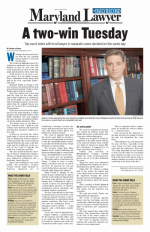On July 3, 2014, criminal defense lawyer Rand Lucey, convinced a Prince George’s Circuit Court judge to dismiss all charges in his client’s robbery case. Despite the State being prepared to go forward on that day, Mr. Lucey successfully argued that previous delays, caused by the State’s witnesses, violated his client’s constitutional right to a speedy trial. Such a result is particularly rare given that the case was still less than one year old.
PRINCE GEORGE’S COUNTY COURTS
Charges Dropped Against Man Accused of Assaulting Girl, 8
By Ruben CastanedaWashington Post Staff Writer
Saturday, March 10, 2007
Prince George’s County prosecutors yesterday dropped charges against a 35-year-old man who was accused of sexually assaulting an 8-year-old girl as she walked from a school bus stop to her Upper Marlboro home last fall.
The decision came after prosecutors obtained DNA test results that exonerated Andre C. King and read statements from defense witnesses who provided a solid alibi for him, said both Prince George’s State’s Attorney Glenn F. Ivey and Andrew V. Jezic, King’s defense attorney.
At the request of Assistant State’s Attorney Donine Gaynor, Circuit Court Judge Sherrie L. Krauser dismissed the charges of first- and second-degree rape against King.
King, who had been jailed without bond at the Prince George’s Detention Center since he was arrested shortly after the alleged attack in September, was to be released yesterday afternoon or evening, Jezic said.
“The state’s attorney’s office in this case did everything right,” Jezic said. “We had many conversations about whether the defendant was innocent.”
Ivey said he decided that charges against King should be dropped because DNA evidence produced no connection between the defendant and the victim and because “the defense produced multiple, credible alibi witnesses.”
“We’re not only here to convict the guilty but to exonerate the innocent,” Ivey said.
DNA results from the county police lab became available about two weeks ago. Genetic material from a swab taken from the victim did not match King’s DNA, Jezic said.
Jezic and Ivey both said they believe the girl was sexually assaulted.
The incident occurred about 2:30 p.m. Sept. 28. The girl had stepped off a school bus and was walking through a neighbor’s back yard along Brimfield Drive when she was grabbed from behind by a man who threatened to kill her, then sexually assaulted her, the documents said.
The girl ran home and told her mother; police found King at his home about four blocks from where the girl said the attack occurred, Jezic said. Police brought the girl to see King, and she identified him as the attacker, according to police charging documents.
Private defense investigators located three witnesses who said King was in his back yard during the time the rape allegedly occurred. The witnesses said King was sitting in a chair from the time the school bus would have arrived until the time police arrested him, according to defense papers that were part of an unsuccessful motion to persuade a judge to grant King a bond.
Ivey said the investigation into the assault would continue.






